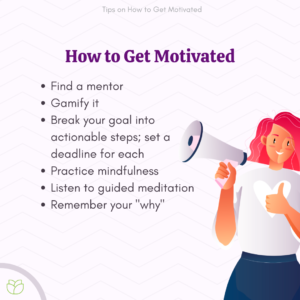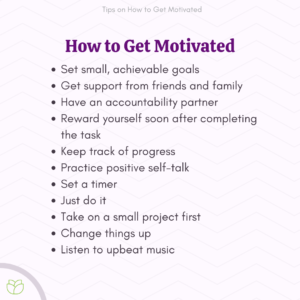Motivation is an important part of goal-setting, learning new things, making meaningful connections, and enjoying life. It helps people be more productive and successful, maintain healthy relationships, and build self-confidence. When low motivation is severe, it can cause problems in every area of your life. Fortunately though, you can take action to increase your motivation.
Want to reach your full potential? Therapy can help you bring into alignment thoughts, feelings and behaviors. BetterHelp has over 20,000 licensed therapists who provide convenient and affordable online therapy. BetterHelp starts at $65 per week. Take a Free Online Assessment and get matched with the right therapist for you.
Why Am I Not Feeling Motivated?
A lot of different factors contribute to lack of motivation including stress, life changes, or underlying mental illness like depression or anxiety. In general, there are two types of motivation: intrinsic and extrinsic motivation. In other words, it can come from internal or external factors. Chronic procrastination can also play a part in lack of motivation, but this can be overcome.
How to Find Motivation: 17 Tips
When you have no motivation, or decreased motivation, there are several things you can try to find it. Consider setting goals and tracking progress, starting with small steps to build momentum, land/or seeking out support and accountability. Sometimes reading inspirational and motivational blogs or listening to motivational podcasts can get you going. Remember, action creates more action, so sometimes the best thing to do is to just pick a place to start and go!
Here are 17 tips for how to get motivated:
1. Set Small, Achievable Goals
When tasks seem too big or complicated, or if the to-do list is too long, it can be overwhelming. It’s easier to achieve your goals if you pick something small and easy to start with (e.g., a 10-minute project). Knocking a small goal off of the list can provide a sense of accomplishment and the necessary momentum to keep going.
2. Get Support From Friends & Family
Sometimes, a pep-talk or supportive conversation with a friend or family member can provide an emotional and mental boost. Tell your friends and family about your goal and ask them to check in with you. Talking things through with a trusted confidant can help shift your perspective and remove any barriers.
3. Have an Accountability Partner
For people who are extrinsically motivated, nothing does the trick quite like accountability! When people have accountability partners, they are less likely to skip out on their commitments. After all, they don’t want to let others down.
4. Reward Yourself Soon After Completing the Task
Researchers have found that motivation increases when a reward comes quickly vs. after a period of time. Rewards don’t have to be expensive or indulgent either! They could be as simple as getting some fresh flowers for the newly cleaned kitchen or having a hot cup of tea after a chilly walk outside.1,2
5. Keep Track of Progress
It can be hard to see progress in the middle of the struggle. Tracking your steps or wins can show you how far you’ve come, which can give you a boost of positivity and the motivation you need to keep going.
6. Practice Positive Self-talk
Negative self-talk is defeating and can destroy motivation. When a negative thought like “I can’t” pops up, notice it, but remember that it’s only a thought and not a fact. Then, immediately replace it with something positive like “I am doing this.” It’s actually possible for you to rewire your brain to think more positive thoughts.2
7. Set a Timer
If you’re motivating yourself to study, I recommend a cube timer or another small desk timer to help break studying into smaller increments. Instead of staring down a marathon study session, set the timer for 30 minutes. Each time the alarm goes off, get up and take a break. If test anxiety is an issue, breath exercises, meditation, movement, and therapy can all help.
8. Just Do it!
This tip is particularly relevant if you’re trying to motivate yourself to workout. People have so many different motivations for working out, getting stronger, and getting healthier; however, realistically, there will be times when motivation just isn’t there. Get changed and go anyway! Exercise has a lot of mental health benefits. Plus, it increases dopamine and endorphins, both of which can increase motivation.3
9. Take on a Small Project First
Take on a small project that won’t take much time. For example, if you’re trying to clear out your entire house, start with a kitchen drawer. It feels great and provides momentum. Just get started! Set guidelines for donating things, too.
10. Change Things Up
Switching things up can be a good way to get out of a funk. Boredom and the daily grind can sap motivation and happiness. Trying something new can break the pattern of lethargy and boredom, and make things fun again.
11. Listen to Upbeat Music
Listening to music can increase motivation, improve endurance, and elevate mood! For a pick-me-up or an energy boost, try putting on some upbeat music before taking on that next task.4,5
12. Find a Mentor
Motivation can suffer when people don’t feel competent or confident. Mentors and coaches can help people gain the skills they need to move forward more confidently. They can teach the necessary skills to confidently take on the task at hand.
13. Gamify it!
Gamification is a hot topic in personal improvement and motivation. The idea of applying game elements – like badges, levels, coins, or rewards – to the completion of tasks has been found to effectively increase motivation. It can make boring tasks more fun, too!5
14. Break Your Goal Into Actionable Steps; Set a Deadline For Each
For example, if you’re struggling to find the motivation to do something that has multiple steps, start by breaking it down into smaller, very clear steps. Give each of these steps a reasonable deadline to help to maintain forward progress and avoid overwhelm.
15. Practice Mindfulness
Mindfulness can help people feel like they are more present in the moment. By practicing mindfulness, you return to the task at hand with renewed focus. Place your attention on the here and now to decrease overwhelm and distraction.
16. Listen to Guided Meditation
There are many high-quality guided meditations available online, including specific ones to increase your motivation. These can be found on free apps like Insight Timer.
17. Remember Your “Why”
When all else fails, it can help to remember why this goal was important to you in the first place. Keep that reason in the front of your mind as you take the first step and every step that follows.
When to Seek Professional Help
Lack of motivation can be a symptom of a more serious underlying mental illness, like depression or anxiety. Lack of energy, depressed mood, constant worry, or chronic lack of motivation are all red flags. If you’re experiencing any of these symptoms, it’s a good idea to seek out professional help.6
If lack of motivation is an ongoing issue or is creating problems at home, at work, or in relationships, therapy can help. It’s particularly helpful to consider finding a therapist who has experience building motivation. Therapists of many different backgrounds, geographic areas, and clinical specialties are available to browse in a therapist directory.
Final Thoughts On How to Get Motivated
Lack of motivation can be a vicious cycle, and often the best way to break that cycle is to get started and face the task head-on. If you’re still struggling and wondering how to find motivation, consider talking to a therapist. The feeling of accomplishment will be worth it!
To help our readers take the next step in their mental health journey, Choosing Therapy has partnered with leaders in mental health and wellness. Choosing Therapy is compensated for marketing by the companies included below. Online Therapy BetterHelp Get support and guidance from a licensed therapist. BetterHelp has over 20,000 therapists, who provide convenient and affordable online therapy. Complete a brief questionnaire and get matched with the right therapist for you. Get Started Psychiatry, with you in mind Talkiatry Our Psychiatrists Can Diagnose Your Condition, Prescribe Medication, And Monitor Your Progress. Most psychiatry visits cost patients $30 or less* Free Assessment Drinking Moderation Sunnyside Want to drink less? Sunnyside helps you ease into mindful drinking at your own pace. Think lifestyle change, not a fad diet. Develop new daily routines, so you maintain your new habits for life. Take a 3 Minute Quiz Relationship Help OurRelationship (Free Couples Course) OurRelationship has been proven to help couples improve communication, intimacy, and trust. 94% would recommend it to a friend. Get Started Mental Health Support Group App Circles Anytime, anonymous, and free. Never feel alone during life’s greatest challenges. Drop-in to live conversations and share thoughts, ask questions, or learn from others on the same journey. Join Circles Now Free Prescription Discount Card Optum Perks Save up to 80% on most prescriptions. Optum Perks provides discounts at over 64,000 pharmacies nationwide. No memberships or costs to you, ever. It’s really that easy. Get your card and start saving. Get the discount card! *Includes copayment, deductible, coinsurance, and $0 Visits. Excludes no shows.Additional Resources
For Further Reading
Online Anxiety Test A few questions from Talkiatry can help you understand your symptoms and give you a recommendation for what to do next. How Does ERP Help With Intrusive Thoughts? Obsessive compulsive disorder (OCD) is a psychiatric condition marked by the presence of obsessive thoughts, images, doubts, or urges, followed by compulsive behaviors or acts aimed at easing the distress caused by the obsession. While the content of the obsessions can take many forms, they are always repetitive, persistent, involuntary, and intrusive, and they often result in a great deal of anxiety for the person experiencing them.









